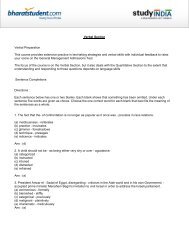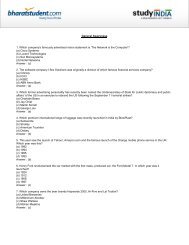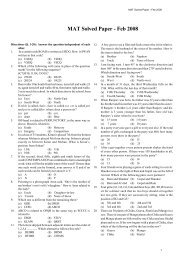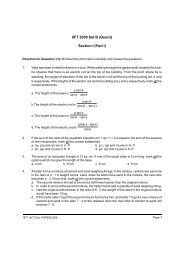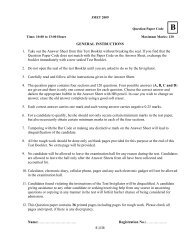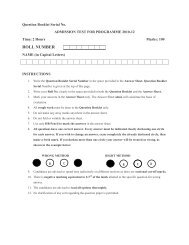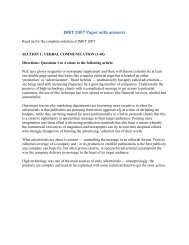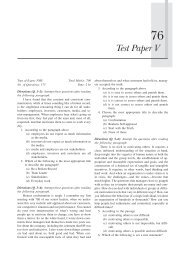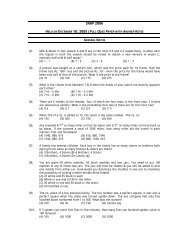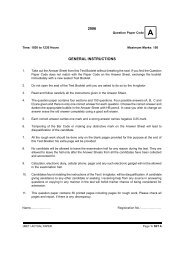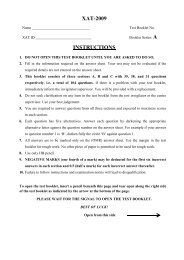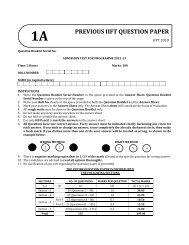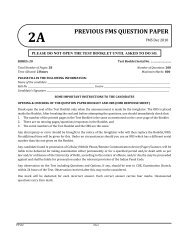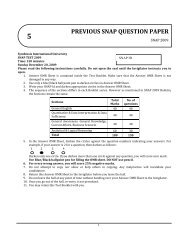SERIES 11 Test Booklet Serial No - Bharatstudent.com
SERIES 11 Test Booklet Serial No - Bharatstudent.com
SERIES 11 Test Booklet Serial No - Bharatstudent.com
You also want an ePaper? Increase the reach of your titles
YUMPU automatically turns print PDFs into web optimized ePapers that Google loves.
financial houses steadily created. a structure of national and international credit to under-pin the<br />
early modern world economy.<br />
Nevertheless, by far the largest and most sustained boost to the "financial revolution" in Europe<br />
was given by war. If the difference between the financial burdens of the age of the Philip II and<br />
that of Napoleon was one of degree, it still was remarkable enough. The cost of a sixteenthcentury<br />
war could be measured in millions of pounds; by the late seventeenth century, it had risen<br />
to tens of millions of pounds; and at the close of the Napoleonic War the outgoings of the major<br />
<strong>com</strong>batants occasionally reached a hundreds of millions of pounds a year. Whether these<br />
prolonged and frequent clashes between the Great Powers, when translated into economic terms,<br />
were more of a benefit to than a brake upon the <strong>com</strong>mercial and industrial rise of the west can be<br />
never be satisfactorily resolved. The answer depends, to a great extent, upon whether one is trying<br />
to assess the absolute growth of a country as opposed to its relative prosperity-and strength<br />
before: and after a lengthy conflict. What is clear is that even the most thriving and "modern" of<br />
the eighteenth-century states - could not immediately pay for the wars of this period out of their<br />
ordinary revenue. Moreover, vast rises in taxes, even if the machinery existed to collect them,<br />
could well provoke domestic unrest, which all regimes feared especially when facing foreign<br />
challengers at the same time.<br />
Consequently, the only way a government could finance a war adequately was by borrowing: by<br />
selling bonds and offices, or better, negotiable long-term stock paying interest to all who<br />
advanced monies to the state: Assured of an inflow of funds, officials could then authorize<br />
payments to army contractors, provision merchants, shipbuilders, and the armed services<br />
themselves. In many respects, this two-way system of raising and simultaneously spending vast<br />
sums of money acted like a bellows, fanning the development of western capitalism and of the<br />
nation-state itself.<br />
Yet however natural all this may appear to later eyes, it is important to stress that the success of<br />
such a system depended an two critical factors reasonably efficient machinery far raising loans,<br />
and the maintenance of a government's “credit" in the financial market. In both provinces led the<br />
way not surprisingly, since the merchants there were part of the government and desired to see the<br />
affairs of state managed according to the same principles of financial rectitude as applied in, say,<br />
a joint-stock <strong>com</strong>pany. It was therefore appropriate that the States General of the Netherlands,<br />
which efficiently and regularly raised the taxes to cover governmental expenditures, was able to<br />
set interest rates very law, thus keeping dawn debt repayments. This system, superbly reinforced<br />
by the many financial activities of the city of Amsterdam, soon gave the United Provinces an<br />
international reputation far clearing bills, exchanging currency, and providing credit, which<br />
naturally created a structure and an atmosphere within which long-"term funded state debt could<br />
be regarded as perfectly normal. So successfully did Amsterdam became a center of Dutch<br />
"surplus capital" that it soon was able to invest in stock of foreign <strong>com</strong>panies and, most important<br />
of all, to subscribe to a whole variety of loans floated by foreign governments, especially in<br />
wartime.



